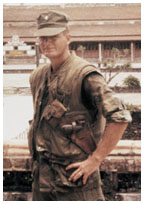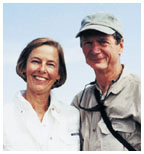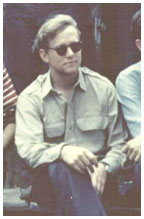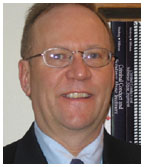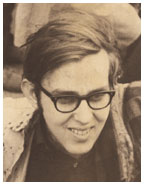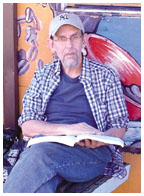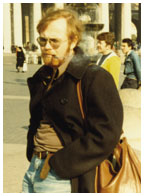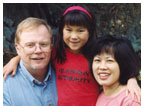Have an opinion about this issue of PAW? Please take a minute to click here and fill out our online questionnaire. It’s an easy way to let the editors know what you like and dislike, and how you think PAW might do better. (All responses will be kept anonymous.) |
March 23, 2005: Features
Will Dickey ’68 Top, Dickey during his service in 1969 at the Imperial Citadel in Hue, Vietnam. Above, Dickey, who teaches a secondary school course on Vietnam, with his son, Chris, and wife, Jean. (Photographs courtesy Will Dickey ’68)
Lane Lasater ’68 Top, Lasater on a camping trip in Colorado with his Princeton roommates shortly before Commencement in May 1968. Soon after this photo was taken, he filed for status as a conscientious objector. Inset, Lasater, a psychologist, today. (Photographs courtesy Lane Lasater ’68)
Jimmy Tarlau ’70 Top, Tarlau as a Princeton student. After graduation, Tarlau worked in a truck factory and drove a cab; today, above, he is an organizer for the Communications Workers of America labor union. (Photographs courtesy Jimmy Tarlau ’70)
Jeff Perry ’68 Top, Perry in the late 1970s. Since graduation, he has worked in blue-collar jobs all over New Jersey and has earned a Ph.D. in history. Above, Perry with his daughter, Perri Hom, who displays a sentiment Perry would endorse; and his wife, Becky Hom. (Photographs courtesy Jeff Perry ’68) |
A
war still with them
The war in Vietnam ended three decades ago, but
for many of those who fought it – or chose not to – it’s
never really over
By Merrell Noden ’78
Wars achieve a terrible kind of immortality. They live on in the shot nerves and phantom limbs of men who, in fighting them, learn that they are anything but immortal. But the Vietnam War stands out even in that long parade of nightmare memories. With the exception of the Civil War, no U.S. war has lingered so painfully in our psyche, dividing and disturbing us, the way Vietnam has.
“Not a day goes by that I don’t think about it,” says John Gore ’68, whose four years at Princeton were broken up by 366 days in Vietnam, where he served as a reconnaissance platoon leader with the 11th Infantry Brigade, stationed at Duc Pho, midway down that crooked finger of a country. “It’s not that I don’t want to talk about it. It’s just hard to find the words. It’s like somebody trying to write about your marriage. It’s something you had to live through, and when you lived it, you were in it and understood it and it became a part of you.”
Gore now works as the director of alumni relations at the Lawrenceville School, near Princeton. Roughly 100 yards from his office is the classroom where his Princeton classmate Will Dickey teaches history, including an elective on the Vietnam War that Dickey refers to, half-jokingly, as “my therapy.” Like Gore, he served in Vietnam, spending six months on patrol trying just to find the enemy. He says he became a history teacher specifically in hopes of understanding what he had just been through. Nonetheless, it took him 15 years to muster the courage to teach that Vietnam elective.
The Vietnam War is still a part of us, even 30 years after it drew to a fitful close. For long stretches of our recent presidential election it felt as if the war had just ended. Night after night on the evening news, we saw photographs of George W. Bush in his flight suit and heard people argue about his service in the Texas Air National Guard. Or we listened to members of the Swift Boat veterans group dispute John Kerry’s service record and fume about his testimony during a 1971 congressional hearing. For so many of those who confronted Vietnam at the time — either by serving in the military forces or by making a decision to avoid service — the election was painful, the war still difficult to discuss. “It’s just too personal,” said one Princetonian of his experience. “I have good old friends I’ve never talked to about that.”
Both for those who served and for those who did not, lives changed, in intentional and unintentional ways. Lane Lasater ’68 found his life’s work because of the war, utterly unexpectedly. His four years at Princeton were a dizzying string of one gut-wrenching moment after another, with the constant threat of the draft ratcheting up the pressure. Lasater was walking out the door to go to his departmental exams when he received his order to report for a preinduction physical. He received news of Robert Kennedy’s assassination a few weeks later, while on a last-hurrah hiking trip to the Rockies with his roommates. He arrived back in Princeton the day the funeral train bearing Kennedy’s body made its way through Princeton Junction en route to Washington.
Coming from a liberal family of ranchers in eastern Colorado, Lasater believed in national service, but thought this particular war was just wrong. “I just couldn’t see what the Vietnamese had ever done to me,” he says. The older of his two brothers, Laurence Lasater ’63, was already in the National Guard; the younger, Dale ’65, in the Peace Corps. “My draft board decided it was time for one of the Lasaters to go,” he says. He contemplated refusing, which meant a probable five-year jail term. “I thought it was the end of my life,” he says.
In a last-ditch effort to avoid being drafted, Lasater applied for conscientious-objector status, fully expecting to have his application rejected since he was neither a Quaker nor a Mennonite. He based his essay on fundamental Christian principles and was stunned when it was accepted. He spent two years working as a mental-hospital attendant, mostly at Bethesda Hospital in Denver. There, he helped lead therapy groups but also had to restrain patients while they got injections and watched them undergo electroshock therapy. He was fascinated by a therapy technique called psychodrama, in which group members assume roles and act out themes. When his service was up he decided to pursue graduate work in psychology, and has had a long and varied career as a psychologist — among other things, working in community mental health and advising prisons around the country.
Over the years Lasater has worked with enough veterans to be grateful that his conscientious-objector application was accepted. “My experience is that for a lot of people who went to Vietnam, and for a lot of people who went to prison [for refusing to go], it ate them up and became a big part of them psychically. It’s seeing too much too soon.”
For the record, 24 Princetonians died serving their country during the war. Another, Dick Gratton ’68, died in 2001, by his own hand. But, says Dickey, who knew him well, Gratton surely was a casualty of that war, one of those who saw too much too soon. He served two tours of duty working with the Montagnards, the mountain people who resisted the Viet Cong. He came home wearing one of the bronze bracelets the Montagnards present to honored friends. Back at home, Gratton suffered severe alienation and depression. He had trouble holding a job and lost his family. “I tried to reconnect with him, but he pushed me away,” says Dickey sadly. You won’t find Gratton’s name on the plaque in Nassau Hall that honors Princeton’s war dead.
One thing that makes the period so painful, surely, is that what was for some an unimaginably sad time was for others pure exhilaration. “The mass movement was incredibly inspiring to me and to every politicized person of my generation,” says Alec Farquhar ’73, who still sounds deeply moved by his memories of those heady days. “To go to Washington, and be surrounded by a million people [for the Moratorium Day mass demonstration on Oct. 15, 1969]. ... You come to believe that your commitment and your ideals are reflected in a broad swath of society and that you have the capacity to change history.” Farquhar and many of his fellow students gloried in the brave new world they weren’t just a part of, but felt they were actually creating on a daily basis, as had no other young generation before them. After graduating, he went to law school in Toronto and immersed himself in the campaign for immigrant rights; he is now director of Ontario’s Office of the Worker Adviser, which counsels workers on health, disability, and benefits. He was one of many students of that era who went into medicine, teaching, and law — a reflection both of a desire to serve others, and the fact that staying in school could delay military service.
“The level of commitment that some people had to their ideals was very deep,” says Farquhar. “People went through a transformation in that era where we started feeling guilty about being upper-middle class and privileged, going to Ivy League colleges, and lots of us started to think about other things to do with our lives: Go work in a factory, take some other kind of blue-collar job, go serve in the Army — why should we be exempt from doing that? We tried to leave behind our privileges and be in solidarity with suffering, exploited people in the U.S. and the rest of the world. People followed through on that in very deep ways and it changed them.”
Jeff Perry ’68, for instance, arrived at Princeton more interested in basketball than politics. “I was a naïve undergraduate,” says Perry. “I didn’t understand much about the war.” That soon changed. After graduation, Perry and a classmate, Gene Bruskin, who also was interested in progressive politics, went to Cuba with the second Venceremos Brigade, a group of young people who showed solidarity with the Cuban revolution by working alongside Cuban workers. There, the two men worked in the fields but found themselves most deeply moved by the chance to talk to a group of visiting Vietnamese. “We got to speak firsthand about the war, in a more neutral setting,” recalls Perry. “I was kind of humbled by the experience.”
Perry came home to work in blue-collar jobs all over New Jersey, including 14 years loading trucks at the Jersey City postal facility. He also earned a Ph.D. in history from Columbia. He now is an officer in the postal workers’ union by day and what he terms an “independent scholar” by night. A few years ago he edited a well-received collection of the work of Hubert Henry Harrison, the “father of Harlem radicalism,” and he has nearly completed a two-volume biography of Harrison. Perry hopes to retire soon to devote himself to writing and to living on very modest means.
Another who chose deliberately to work at the grassroots level was Jimmy Tarlau ’70, who arrived at Princeton two years after Perry with a political consciousness more fully formed. Disappointed by the level of political involvement he found on the Princeton campus in the fall of 1966, Tarlau thought seriously about dropping out to join VISTA, the domestic Peace Corps, but decided to stay on, with the goal of radicalizing the University. Working for New York congressman William Fitts Ryan ’44 during the summer after his freshman year, he quietly researched the Institute for Defense Analysis, which was located in Princeton and would become the target of many protests by the antiwar group Students for a Democratic Society (SDS). Tarlau later was one of three students suspended from Princeton for participating in the “Hickel Heckle” — in which radical students harassed Walter J. Hickel, President Nixon’s secretary of the interior, when he came to speak on campus. Later, a letter of apology was sent to Hickel, bearing 1,400 signatures. The outburst cost Tarlau the right to graduate with his class, not that he was particularly troubled by that. (Not everyone on campus opposed the war: In a poll taken of members of the Class of 1968 when they were graduating, 42 percent said that they were against the war. In a 1998 survey of the same class, 60 percent said they opposed it.)
By the time Tarlau received his Princeton diploma in the mail some six months after his class had graduated, he already had chosen a road not taken by many Princeton graduates. For a time he worked in a truck factory, building both trucks and a more radical consciousness among his fellow workers. He drove a cab. He is now a union organizer for the Communi-cations Workers of America, a job he describes as “probably one of the few occupations where having a Princeton degree hurts, or at least doesn’t help.
“For a lot of us who grew up in that time, you really saw how you’re part of the period you live in,” says Tarlau. “If I’d been five years younger or five years older, I’d have had a completely different path in my life. ... I’d still have been involved in politics but it would have been a different kind of politics. I’d have worked for some congressman or a senator. I would have been one of those guys in West Wing. I sometimes wonder whether I could have been a big shot. On the other hand, when I look in the mirror and say, ‘How do you actually change this country,’ that’s not how you change the country. ... Basically, it’s union organizations that elect progressive candidates and also push candidates to take better positions.”
One of Tarlau’s closest friends at Princeton was Doug Seaton ’69. Seaton was quickly caught up in campus politics, becoming chairman of SDS and the Draft Resisters Union. For a time, he rode the enlistment buses ferrying New Jersey kids to Fort Dix, some 20 miles south of Princeton, hoping to stop them from signing up. He was punched a number of times for his trouble. In the Nassau Herald he wrote, “Upon graduation, Doug plans to struggle for socialism and eventually hopes to win the struggle.”
But that’s not what happened. Seaton has undergone something of an apostasy. Now a lawyer in Minneapolis, he often represents small businesses being sued by workers. He looks back at his days as a campus radical with good-natured amusement. How does he explain the change? “The war started
to fade away and didn’t occupy so much space in everyone’s thinking. It had its own tunnel vision,” says Seaton. At Princeton, he says, “I didn’t have any connection to the economy or to my hometown. I was very isolated and very much in this cocoon world of the New Left.” His turnaround accelerated when members of SDS, including Kathy Boudin, with whom he had worked during summers back home in Cleveland, turned to violence. Since then, Seaton says, he has been “progressively circling back” and is now active in Republican politics in Minnesota — where, he says, “I encounter my old self all the time.”
Royal Masset ’67 went through much the same change. He went to the Democratic Convention in Chicago in 1968 to impress a girlfriend, he says, wearing a coat and tie because he figured it would be safer. Perhaps it was, since he avoided getting beaten in the madness on Michigan Avenue. So he would never forget what he witnessed on that street, he returned later that night with his Princeton beer jacket and daubed it with the blood on the street. He has spent his life in politics since then, which hadn’t been his plan. But after reaching the peak of his radicalism in 1972, when he worked for the Peace and Freedom Party in Austin, he too has moved over to the Republican Party, working as a political consultant during its long climb from the wilderness to power in Texas. “I was never anti-military so much as I’m anti-stupidity,” he says.
Dickey, whose work literally is teaching the lessons of Vietnam, says his students — all of whom were born years after the war — have “a great curiosity about [Vietnam]. There’s a vague sense of intrigue about it.” Many, he says, have a relative or family friend who fought there. “Often they’ll say to me, ‘He never says anything about it: Why is that?’ They really want to know what’s inside this person.”
Dickey takes an interdisciplinary approach to teaching about the war. He uses movies, popular features, and documentaries, plus literature and music. Each year, he also brings in at least three people with direct experience of the war — soldiers, mostly — to talk to his class about their experiences. One day Dickey’s friend Gratton came in, but he simply broke down and couldn’t speak. “It broke my heart,” says Dickey.
Fighting in that particular war was an isolating experience, he believes. There’s a stain that comes with the “Nam,” a sense of alienation, totally unlike the experience of World War II vets. That’s true whichever side one was on. Gore and Dickey certainly talk to each other about their experiences, but neither goes out of his way to mix with the men he served with. “VFW chapters don’t have as many vets from Vietnam as they do from other wars,” notes Dickey, adding that a friend counseling him on his career once urged him to drop all references to his military service from his résumé. “My initial attitude was to put it behind me,” he says. “It was not socially acceptable to go around saying, ‘I’m a Vietnam veteran’ in the early ’70s.”
That has changed, of course. Just as we now do a better job of honoring
veterans’ service, so they have learned to accept those who made
different choices back then. “Over time I’ve grown not just
to accept, but to respect, the views of the antiwar people,” says
Dickey. Noting that his younger brother was a conscientious objector,
he adds: “Even in my own family there were great differences regarding
the war. One idea is that most of the vets and the antiwar people respect
each other because we all went through that experience together. We all
got bruised and battered one way or another, but we shared that experience.”
![]()
Merrell Noden ’78 is a frequent PAW contributor.


